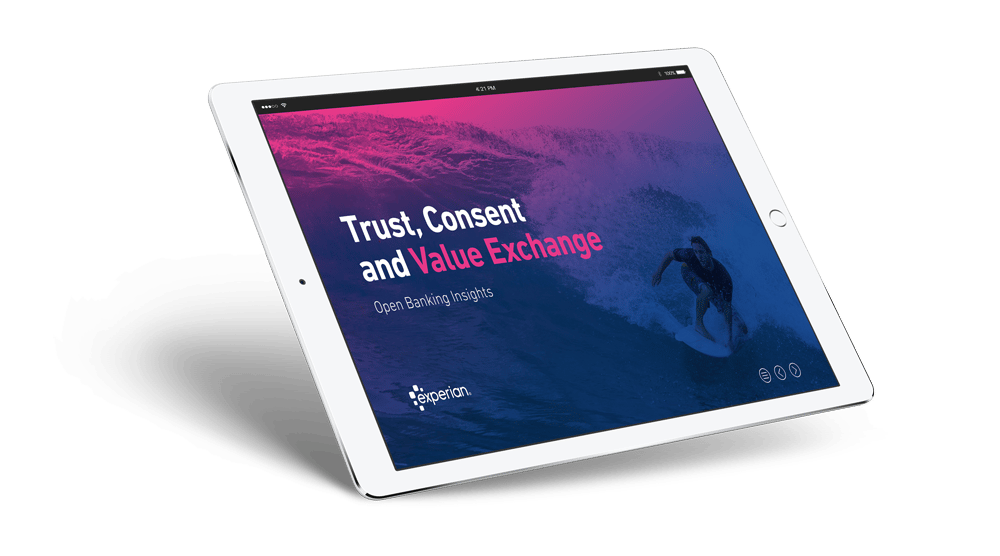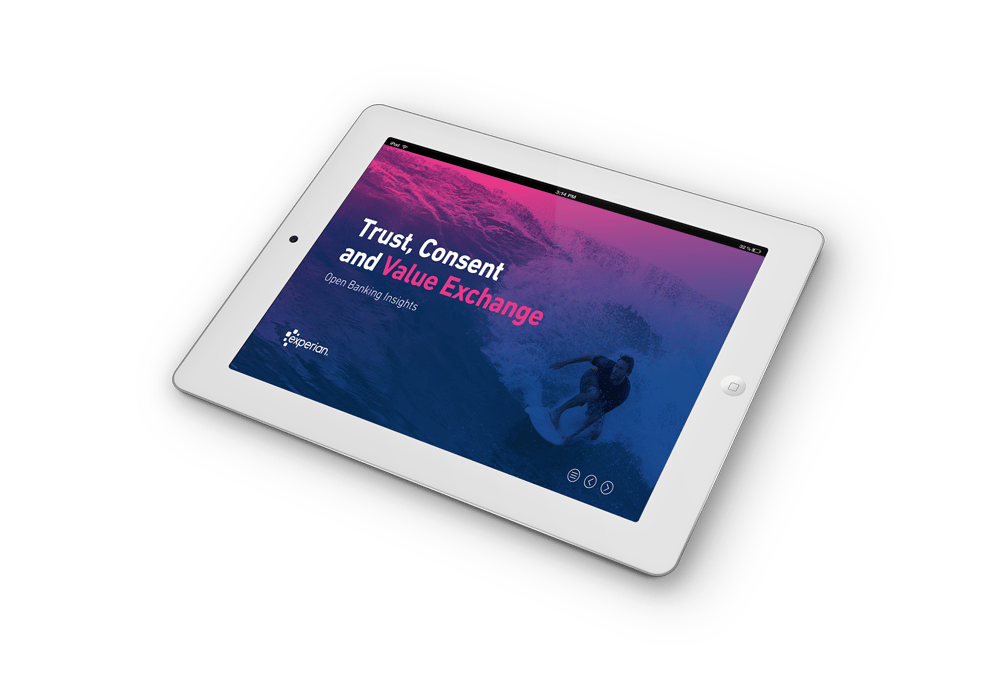The research shows that trust is the key driver in terms of customers’ willingness to share data.
Paragraph text - Roboto Light 16
H1 - Roboto Light 40
H2 - Roboto Light 32
H3 - Roboto Light 26
H4 - Roboto Light 22
H5 - Roboto Light 18
H6 - Roboto Normal 16
Strategies for creating and sustaining trust need to cover three elements:
The availability of customer-consented access to data is a gamechanger It allows businesses to increase the value of customer relationships in terms of revenue, loss reduction, reduced costs and reduced attrition. This in turn will help increase profitability, margin and ultimately shareholder value.
However, our exclusive research has revealed that half or more senior executives and decision makers at European Banks and Telcos say they are worried about consumer consent for Open Banking services.

Access-to-account consent journeys by nature require the customer to move between separate environments – the host business that is making the value offer to the customer, the service provider acquiring the account information, and the customer’s bank account. To maximise user reassurance, confidence and understanding, the role of each of the actors should be explained in simple, easily understandable terms and with secure and clearly signposted handoffs to guide the customer through the journey.

The reputation of the organisation making the offer is vital as customers need to be confident in the businesses’ ability to safeguard their data and privacy. This requires a blend of ongoing diligence to protect against potentially damaging events and situations that might arise plus a commitment to fast, visible action and open and transparent messaging if and when they do.
In addition to being transparent, clear and understandable, access-to-account consent journeys should be designed in such a way that they deliver a consent experience that is both meaningful and engaging. Customer consent processes should not encourage the user to simply click, tick and move on. Instead, users should be encouraged to take time to understand what consent actually means in terms in terms of purpose, process, duration and revocation.
The reputation of the organisation
1
Consent journey
2
Value being offered
3
The third element of trust is the value offer itself. The offer should be sufficiently compelling that its perceived value outweighs any remaining concerns about security, protection and brand.
To maximise customers’ perception of value offers should be designed to be:
As a regulated Account Information Service Provider (AISP), Experian can help organisations build and scale highly secure and effective customer access to account journeys that reflect each of the three elements of trust outlined above. We offer a range of services through our open banking consent, categorisation and insight platform which will enable you to create and accelerate the wave of change created by the increased role of customer consented data.
Our research considered 6 different types of value based on need, convenience and security and revealed increasing levels of positive responses regarding willingness to give consent.


Relevant to the customer’s needs
Offered at the point in time where the customer fully realises the exact nature and extent of their individual needs
Experience-enhancing in terms of reducing or removing much of the effort, time and complexity that would otherwise apply












21%
are unlikely to share their transaction data
BUT

Would be willing to change their mind for the right reason:
To ensure they don’t have to send physical paperwork
46%
48%
To get a preferential offer (e.g., a better loan rate)
49%
To guarantee a faster application

REPUTATION


The reputation of the organisation
The reputation of the organisation making the offer is vital as customers need to be confident in the businesses’ ability to safeguard their data and privacy. This requires a blend of ongoing diligence to protect against potentially damaging events and situations that might arise plus a commitment to fast, visible action and open and transparent messaging if and when they do.
VALUE BEING OFFERED

CONSENT JOURNEY




Watch the video interview with David McGeachie about Open Banking
The adoption of Open Banking is steadily increasing across the globe. One of the main reasons for this is that consumers are becoming more willing to share their data – on the condition that businesses offer assurance of data security and can demonstrate the value of sharing data.
Download your copy of our whitepaper “Trust, consent and value exchange” with a focus on Open Banking in Italy, Netherlands and Spain
Consent journey
In addition to being transparent, clear and understandable, access-to-account consent journeys should be designed in such a way that they deliver a consent experience that is both meaningful and engaging. Customer consent processes should not encourage the user to simply click, tick and move on. Instead, users should be encouraged to take time to understand what consent actually means in terms in terms of purpose, process, duration and revocation.
Access-to-account consent journeys by nature require the customer to move between separate environments – the host business that is making the value offer to the customer, the service provider acquiring the account information, and the customer’s bank account. To maximise user reassurance, confidence and understanding, the role of each of the actors should be explained in simple, easily understandable terms and with secure and clearly signposted handoffs to guide the customer through the journey.




Value being offered
The third element of trust is the value offer itself. The offer should be sufficiently compelling that its perceived value outweighs any remaining concerns about security, protection and brand.
To maximise customers’ perception of value offers should be designed to be:



Relevant to the customer’s needs
Offered at the point in time where the customer fully realises the exact nature and extent of their individual needs
Experience-enhancing in terms of reducing or removing much of the effort, time and complexity that would otherwise apply



As a regulated Account Information Service Provider (AISP), Experian can help organisations build and scale highly secure and effective customer access to account journeys that reflect each of the three elements of trust outlined above. We offer a range of services through our open banking consent, categorisation and insight platform which will enable you to create and accelerate the wave of change created by the increased role of customer consented data.
Our research considered 6 different types of value based on need, convenience and security and revealed increasing levels of positive responses regarding willingness to give consent.
Learn More

Download the research

Download now
